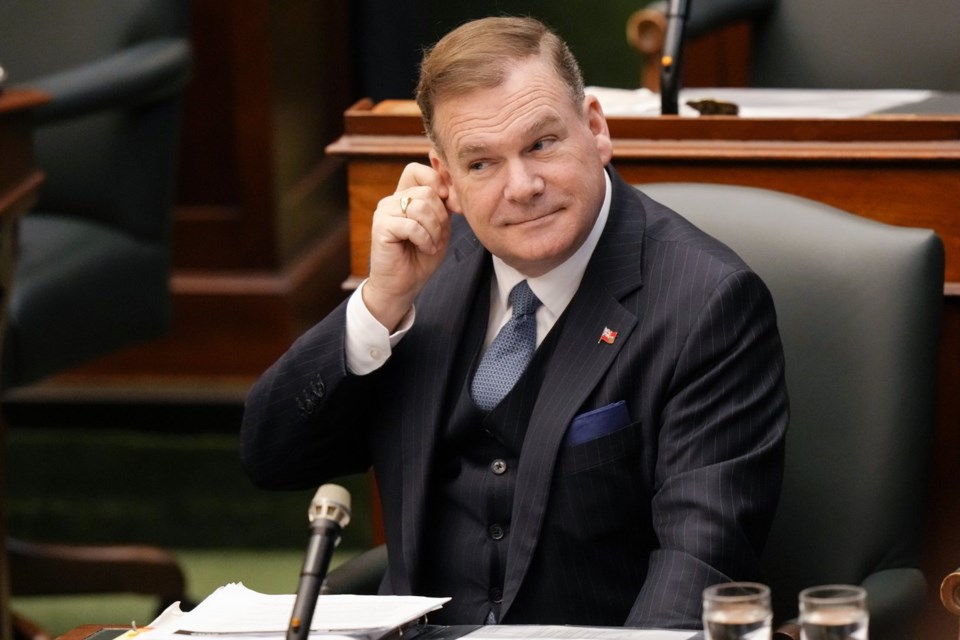TORONTO — Ontario's environment minister has apologized to First Nation chiefs for any "confusion" his letter caused when he asked the federal government to not reintroduce a bill that would enshrine clean drinking water rights in law.
But many First Nations are not accepting what they call a meaningless apology and still want Todd McCarthy fired.
"The intention of my previous letter was to highlight the urgent need for the federal government to ensure a regulatory environment that fosters economic growth and prosperity for all of Canada, including for First Nations communities, while respecting provincial jurisdiction," McCarthy wrote in a letter sent to all First Nation chiefs and grand chiefs across the province.
"We strongly believe this is not an either-or proposition: we can and need to bring clean drinking water to First Nations communities, while also bringing the kind of regulatory certainty that attracts investment in businesses and communities. I apologize for the confusion caused by the previous letter."
Anishinabek Nation Grand Council Chief Linda Debassige was fuming on Friday.
She called McCarthy "absolutely incompetent" and said his latest letter was insulting. The biggest issue, she said, was that he did not withdraw his request to the federal government.
"It's all smoke and mirrors because he got caught and now he's trying to cover his tracks," said Debassige, whose organization represents 39 First Nations in northern and southern Ontario.
"This is not a meaningful apology and he's assuming that our leadership is not intelligent in this letter."
He needs to lose his job, Debassige said.
"I think the premier has both now a moral and ethical obligation to respond to this insanity by removing this minister," she said.
The province has said McCarthy will remain in his post.
Last month, McCarthy and Alberta Environment Minister Rebecca Schulz wrote to federal Environment Minister Julie Dabrusin asking her to move away from legislation that they say would "delay project development and undermine competitiveness."
They singled out Bill C-61, legislation introduced in the last Parliament that sought to ensure First Nations have access to clean drinking water and can protect fresh water sources on their territories.
The bill faced a lengthy committee process but was not passed into law before Parliament was prorogued earlier this year. Dabrusin said last week that her government plans to reintroduce it in the fall.
Now Debassige, who helped draft the legislation with the federal government, is worried Ottawa may change the clean drinking water bill and weaken it in response.
There are 37 First Nations across the country that have long-term boil-water advisories, and 26 of them are in Ontario. Neskantaga First Nation in northern Ontario has not had clean drinking tap water for more than 30 years.
The Chiefs of Ontario, which represents all 133 First Nations in the province, and Nishnawbe Aski Nation, which represents 49 First Nations in northwestern Ontario, condemned McCarthy's request.
New Democrat and official Opposition Leader Marit Stiles said she's met young First Nation women in their 20s and 30s who have never been able to drink water from the taps.
"The minister of environment had the gall to ask the federal government to suspend any actions to solve that problem," Stiles said. "It is depraved and outrageous."
The environment minister's original letter to the federal government came at a fraught time for the province.
Premier Doug Ford's government recently passed Bill 5 into law. The aim of that legislation is to speed up the approval and construction of large projects, including mines.
One part of that bill gave cabinet the power to suspend provincial and municipal laws through the creation of so-called "special economic zones."
Ford has said the mineral-rich Ring of Fire in northern Ontario will be the first such zone.
That law sparked numerous protests at Queen's Park in Toronto. A similar bill introduced by Prime Minister Mark Carney's Liberal government that recently passed into law strips away many land protections in an effort to quickly build projects deemed in the "national interest."
In response, community members from Attawapiskat First Nation and Neskantaga First Nation have begun building permanent encampments along the Attawapiskat River at two proposed bridge crossings for the road to the Ring of Fire.
McCarthy's apology was the second by the province to First Nations in recent weeks.
Debassige and several dozen First Nation chiefs met with Premier Doug Ford a few weeks ago to discuss Bill 5. Ford had said the day before that First Nations should stop coming to him "hat in hand" if they don't get on board with the bill.
He then apologized to Debassige and those chiefs in a private meeting before repeating it at a news conference on live television. Debassige and the chiefs accepted that apology and agreed to move forward with extensive consultations on the new law.
Debassige said Ford told them that day he was in full support of clean drinking water for all Ontario First Nations and was going to figure out a way to help.
This report by The Canadian Press was first published July 11, 2025.
Liam Casey, The Canadian Press




